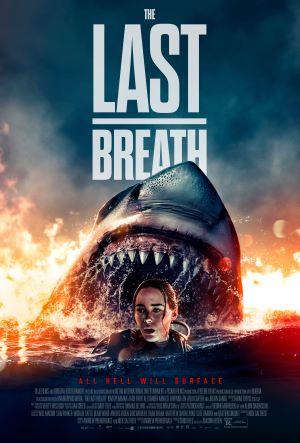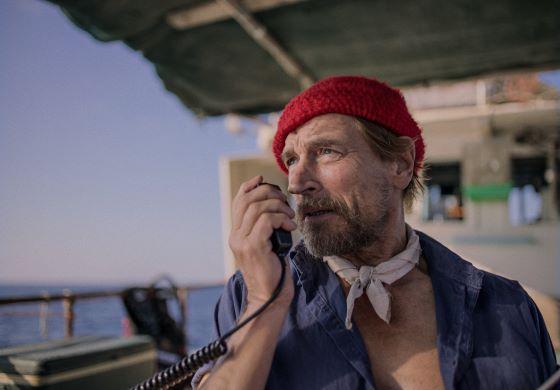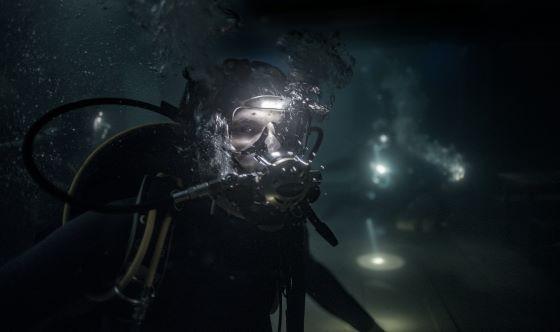

[Rating: Minor Rock Fist Down]
Opens Friday, July 26
A baffling inversion of what should suck versus shouldn’t suck, The Last Breath nails the look/feel of diving and sharks while missing the human and character elements by a mile. A haunted-house creature feature of sorts, the movie teases an interesting concept by way of the setting and setup, and even manages to seamlessly incorporate the CGI into what looks like real diving footage. Yet the product on screen feels like less of a movie and more of a proof-of-concept sizzle reel for someone hoping to land the next Aquaman directing gig.
A cold open flashback to a World War II naval engagement off the British Virgin Islands buffers the narrative, which sees young adult Noah (Jack Parr) working with charter captain Levi (Julian Sands) to find a shipwreck some 80 years after the featured battle. Noah’s dive uncovers the wreckage, the USS Charlotte, a discovery he eagerly shares with 4 of his friends who just happen to be visiting from the mainland. Although maritime laws and regulations require Noah and Levi to report the finding rather than return to it, a generous financial offer by Noah’s most obnoxious friend, Brett (Alexander Arnold), entices them back the next day.
Noah, Brett, Brett’s sister / Noah’s -ex…maybe, Sam (Kim Spearman), stoner goofball Logan (Arlo Carter), and red-shirt Riley (Erin Mullen) all dive into the battleship to explore the wreckage. And despite the painful line drops about all of them being experienced divers (this movie wouldn’t work otherwise), each save Noah approaches the endeavor with a cavalier, totes-extreme level of reckless abandon. Things go predictably sideways before too long, and the labyrinthian battleship and resident sharks (that weren’t there the day before) put the pressure on Noah and company to get topside before their collective and eponymous last breath.

And while all of this looks good, which is no small feat, the dialogue is clunky and suffers the misfortune of coming mostly through a respirator intercom system. This looped ADR during what are supposed to be hectic and riveting scenes largely rob the moments of their tension and aren’t aided by the masks that keep the actors’ faces and expressions hidden. And again, while the movement and the action look decent, they are paired with cartoonish interplay between character placeholders whose lines sound like they were recorded in the jump seat of a Honda Civic.
Who is Noah, and what are these people to him? There’s a line early on about how they only get together every two years or so, but there’s nothing to establish just what their connection is, and why they matter to each other. Sam’s breathless scowl when Noah hints that he might be romantically seeing someone paints the pair as one with history, but this is as close as the movie comes to establishing a framework for their connection as a group.

One reason for this becomes somewhat obvious as the story progresses: these people don’t need a history or elaboration any more than the cow that becomes a Big Mac does. They are a resource to be consumed and just as quickly forgotten, and the script by Andrew Prendergast and Nick Saltrese treats everyone as such. Brett, Riley, and Logan are so patently awful as human beings that they almost get the audience on “Team Shark,” and while Sam seems like a decent person, her anchor to the story is a nothing-burger of a person, who also happens to be the lead of the picture.
A 20-something Spielberg made this all look so easy: a long-cherished Hollywood irony born out of the notoriously troubled Jaws shoot mythos. Lightning, floods, spiders, sharks: these things frighten humans on an instinctive level, so tapping into them as on-screen boogeymen seems like nothing if not a slam dunk proposition. Yet what made Jaws scary wasn’t the shark so much as what it represented as a proxy for the unknown and uncontrollable, and how that informed the actions of interesting, knowable characters.
The audience knows next to nothing about Noah, Brett, Sam, and co., and there’s no basis for the conflict the scripts presents. Where did all these friggin’ sharks come from all of a sudden, and what is it about these people, this place, and the toothy creatures that makes all of this important? Sure, people in danger is a great start to a story, but that’s all it is: a start.
Director Joachim Hedén knows where to put the camera to heighten tension and has a firm grasp on the not-at-all easy job of incorporating practical footage with the computer-generated elements, yet that’s where this movie stops racking up wins. And this is kind of remarkable, because good scripts and great actors are often wasted on films that quite understandably have difficulty with the water aspects of a shoot (not to mention believable CGI). The Last Breath has plenty of problems, but these aren’t among them, giving it the look and feel of a proper suspense thriller without the soul of one.





Comments on this entry are closed.